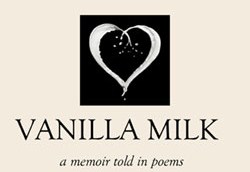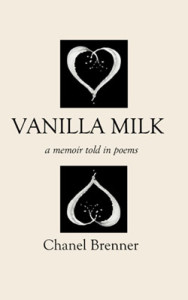Reviewed by Lindsey Grudnicki
“When Riley’s brother, Desmond, asked, ‘Why did Riley die?’ I wrote a poem.” – Chanel Brenner
It is not every day that I read a collection of poems that lays bare to me the writer’s soul. It is not every day that I read a poem that truly breaks my heart. And it is not every day that I find solace in sadness or hope in tragedy. The day I read Chanel Brenner’s work was not an ordinary day.
Vanilla Milk: a memoir told in poems is Chanel’s book-length elegy to her son Riley. Through her memories, we see her little boy being diagnosed with arteriovenous malformation (AVM). When he is suddenly taken at the age of six by a brain hemorrhage, we live in the world Chanel faces each morning – a world without her son. We follow her into the hospital room, through the hallways of her family’s home, to the grocery store and her son’s school, to the cemetery, and into her innermost thoughts. The landscape she finds herself in is honestly, courageously, and authentically opened up for the reader to inhabit.
We are also blessed with the gift of meeting her son. Her short tributes to Riley “keep him alive,” for her and for us. She captures her darling in words and photographs, sharing him with a world that, while robbed of his light, should know the light his family basked in and now carry within them.
Chanel’s writing is an outlet for her grief. This collection is her river of tears, her screams, her prayers, and her rediscovered hope. It is her need to “create something out / of nothing, life from loss.” “Isn’t that what poets do?” she asks in “What Would Wislawa Szymborska Do?” as she resurrects her child line by line. She recreates Riley in her poems, from his golden hair and laughter to his first permanent tooth. There is power in her memories, but simple remembrances are not enough to deal with the loss. Creating something from the emptiness demands more of her.
“What are you now? / A flicker of light, / an unexpected surge of water, / a false alarm? / I look up to see you, / but not through my eyes, / and time dissolves / like the gravity of two worlds / has pulled it together / and we are something else.” (“Something Else”)
This process of becoming “something else” runs through Vanilla Milk. As her grief evolves, as new challenges confront her in the aftermath of her son’s death, Chanel finds herself to be a poet, a wife to a grieving husband, and a mother to one son instead of two. Her work testifies to the transformation she’s undergone and speaks to each stage of the journey. There isn’t a linear path between her rage, confusion, sorrow, and peace; there is no predictable progression from one stage to another. But her emotions are cyclical, ever-changing, and strong, and this comes through in the organization and patterns of her writing.
Through a variety of poetic structures and the intermittent use of prose, Chanel’s language reflects the mood in which each piece was written. In the preface to her book, she explains that her poems were inspired by specific circumstances, initially composed in moments of heightened emotion, and written over a span of time as she underwent an adjustment to a new reality she did not choose. Vanilla Milk covers the spectrum of feelings and thoughts that accompanied that adjustment. Utter despair is present, most memorably in the chanted regrets of “I Want” – “I want him buried / in a proper casket, / uncut, intact.” There is self-reflection, a conscious recognition of clinging to a possible future that is no longer available to her and the terrifying question of “How will I stop?” (“Mothering a Dead Child”). Chanel also shares her dark humor, ironically observing that “When Riley was alive, / I couldn’t carry him anymore. / It hurt my back. / Lucky for my spine, / death doesn’t weigh in pounds” (“What We Carry”). And in “God as a Waiter,” we witness her crisis of spirit as she remarks that “The last thing I ordered from Him, / I never received.”
Anger and unanswered prayers, however, are not the end of her story. With lush, gentle language, Chanel speaks of the enduring promises of life, of her love for her family, and of the hope that eventually takes root in her worn heart. Through the beautiful dream images of “The Robot Poet,” in which “Death makes time / too vast to measure. / The sun never sets, / the wildflowers bloom forever. / The double rainbow stretches / for eternity in the cloudless sky,” to her realization that “I Have 2x the Love for 1 Child,” she explores the potential for “something else.” Though permanent challenges lie ahead, Chanel recognizes new capacities within herself for love, joy, and peace. There are obstacles daily – seeing a toy her son would have loved in a store, being unable to part with his clothing – but her poems conclude with hope. In “His Heart Takes Flight,” her son is still lost – and as readers, we feel that loss acutely by this point – but another child is saved by his organ donation. Though the wound is deep and will never fully heal, Vanilla Milk creates “life from loss.” After all, that’s what poets do.
Vanilla Milk: a memoir told in poems by Chanel Brenner is now available from Silver Birch Press and on Amazon.



